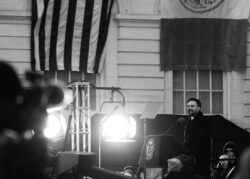On the first day—well, Tuesday—the Pope crossed the Atlantic, and he saw that it was good.
On that day, he told reporters on his airplane (Shepherd One, natch) that he was “deeply ashamed” by the pedophile priests who raped children in this country. He said he hopes to avoid the problem in the future by emphasizing the importance of a strong discernment in potential priests. It was Benedict XVI’s strongest direct statement on the Church’s failure to protect its most vulnerable members.
That is not enough. More often than we realize, Catholics must find wisdom in the words of someone outside the fold—in this case, someone outside everyone’s fold, the grumpy atheist Chris Hitchens, who wondered in a recent Slate column, “Why is the Vatican continuing to shelter Cardinal Bernard Law?”

Why indeed? Law, who was head of the Boston Archdiocese during the worst of the scandal, not only knew about many cases of rape and did not report them, but also seems to have worked actively to cover up the activities and protect the priests in question from the rightful consequences of their actions. I write “seems” because the proper legal authorities haven’t had the opportunity to look into Law’s actions. The Cardinal resigned his post in Boston and lit off to the Vatican, beyond the reach of the law of man. I only note that he is not beyond the reach of a higher law.
This is, of course, why I tend to get a little disheartened when bombastic Catholics proclaim that the Church is the infallible source of all truth.
On the second day, the Pope reached the age of 81, and he saw that it was good.
On that day he also met with President Bush and American bishops. While trumpeting his defining message—to battle against the “dicatorship of relativism” and secular challenges—he avoided the few issues that united him with Bush: gays, abortion and stem-cell research; or the many that divide them: the death penalty, the war in Iraq, the problem of poverty, the dignity of workers, or the care of God’s creation. A more active witness by the church would be a stronger message in favor of religion than any complaints about relativism.
But any political ministry from a Church with untended gardens of its own reminds me of someone else who catches flak for his minister, Barack Obama. Any Catholic who thinks that Obama should abandon Rev. Jeremiah Wright, who has said many reprehensible things in addition to the many good things he has done in his pastoral career, must take a hard look at their own beliefs. Obama has rejected Wright’s offensive comments and criticized his views. Catholics must do the same to their Church. Both actions follow the same principle: that it is better to be a voice for change than to abandon an important institution altogether.
This is, in fact, why Obama is the best candidate for voters who think religion is important. He takes it seriously, certainly more seriously than John McCain, enough to believe that it is worth taking political damage to maintain his faith conversation. Whether you disagree with his positions on the issues, not one presidential candidate will do, and has done, more to rehabilitate the place of faith in public life. Reading his 2006 Call to Renewal address on the importance of religion in politics, I have come to believe that if Obama is President when the Pope decides to visit the U.S. again, then Pontiff and President will share much more in common than they did yesterday.
It will be yet another deep shame if, once again, conservative Catholic bishops urge the American faithful to vote against Obama merely because he is pro-choice. They would be shooting themselves in the foot on a grand scale if they think hurting Obama is the best way to achieve the ends of Catholic social teaching.
Today, the Pope will deliver a mass at Nationals Stadium, and (hopefully) he will see that it is good.
Barring unforeseen circumstances, I’ll be at the Mass. Benedict XVI is my Pope, and I look forward to celebrating the Eucharist with him. But he should look forward to hearing my concerns and criticisms, and those of many other Catholics here. After all, this is America. We speak our minds.
In the coming days, the Holy Father will set his sights on New York, speaking at the United Nations and meeting more Catholics. Some of his advisors have hinted that he may meet privately with victims of priestly abuse, and that would be good. No doubt he will speak strongly about human rights and justice at the U.N., and that will be good. But it would be best if he heard the concerns of his Church here and around the world—seeking truth in a bewildering timeshy;—and responded with the promise of progress.




